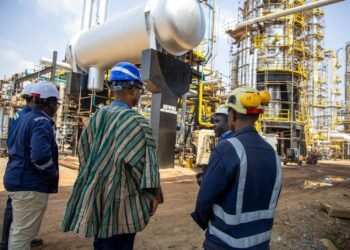The U.S. Department of the Interior has announced a critical policy advancement aimed at increasing offshore oil output in the Gulf of America.
The Bureau of Safety and Environmental Enforcement (BSEE), under the direction of the Department of the Interior, updated regulations surrounding Downhole Commingling in the Paleogene (Wilcox) reservoirs. The pressure differential allowed between reservoirs has been expanded from 200 psi to 1500 psi, enabling oil operators to extract more oil from a single well more efficiently.
“This is a monumental milestone in achieving American Energy Dominance. We’re delivering more American energy, more efficiently, and with fewer regulatory roadblocks.
“That means lower costs, more jobs, and greater security for American families and businesses as President Trump promised.”
Doug Burgum, Secretary of the Interior
The Department of the Interior emphasized that the new guidelines support broader national objectives of energy affordability, security, and competitiveness.

By unlocking additional barrels from existing operations, the U.S. can maintain long-term price stability and reduce exposure to international market volatility.
Moreover, the policy enhances resource conservation by accelerating development from each reservoir, ensuring that fewer hydrocarbons are left unextracted.
In the context of increasing global energy demand, maximizing output from existing fields is viewed as a prudent and strategic approach.
“We are showing what’s possible when industry and government work together under a shared vision.
“We’re not just talking about energy dominance—we’re delivering it.”
Doug Burgum, Secretary of the Interior
U.S. Oil Output to Rise

According to BSEE estimates, the regulatory adjustment could result in a 10% increase in production, equating to over 100,000 additional barrels of oil per day over the next decade. These numbers could rise further as operators gather and submit more performance data.
The update reflects findings from recent studies, including a comprehensive report by the University of Texas.
That study revealed that downhole commingling—combining oil flows from multiple reservoirs in one well—yields significantly higher output than sequential development strategies.
Over a 30-year period, commingled production can result in 61% more oil recovery, with a 21% gain over 50 years.
“Thanks to the tireless work of our technical experts and our industry partners, this advancement enables increased recovery from existing wells.
“It reduces the cost per barrel and strengthens our nation’s energy independence.”
Kenneth C. Stevens, Principal Deputy Director of BSEE
The updated policy replaces a 2010-era framework that many in the energy sector viewed as outdated.
The decision was based on extensive technical consultations with offshore operators, who have long argued for commingling permissions with larger pressure differentials.
Operators must now comply with new technical conditions, including fluid compatibility certification, robust pressure monitoring, and mandatory performance reporting to BSEE.
These requirements are designed to ensure reservoir integrity and environmental safety while enabling more flexible and efficient operations.
“This is a major win for domestic energy. We’re extracting more from what we already have, without the need for new infrastructure or additional leasing.”
Kenneth C. Stevens, Principal Deputy Director of BSEE
Industry leaders have welcomed the decision, viewing it as a pragmatic step toward reinvigorating American offshore operations.
The policy aligns with the Trump Administration’s broader goal of achieving energy independence and securing the nation’s position as a global energy leader.
It is expected to reinstate confidence among Gulf producers, attract new investment, and create thousands of energy sector jobs over the next several years.
The expansion of Downhole Commingling parameters in the Paleogene reservoirs marks a significant step forward in the U.S. energy sector.
As the construction phase begins, the Gulf of America stands as a testament to the power of innovation and collaboration in achieving energy dominance.
READ ALSO: Wencai Zhang Calls on Finance Minister, Pledges Stronger World Bank-Ghana Partnership























